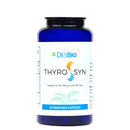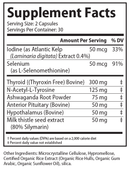Description
ThyroSyn provides nutrients, glandulars, and targeted herbals to support the thyroid and the HPT axis.
INGREDIENTS:
- Iodine (from kelp) (50 mcg)
- Selenium (as Selenomethionine) (50 mcg)
- Thyroid (Thyroxine Free) Bovine (300 mg)
- N Acetyl L Tyrosine (125 mg)
- Ashwaganda Powder (75 mg)
- Anterior Pituitary, Bovine (50 mg)
- Hypothalamus (50 mg)
- Milk Thistle Seed Extract (50 mg)
Why ThyroSyn?
This comprehensive formula provides micronutrients, glandulars, and targeted herbals to support one of the principal glands in the body. Thyroid hormone production can be disrupted by several factors, like environmental toxins, normal hormonal fluctuations and nutrient deficiencies. Thyrosyn helps provide the body with support for healthy thyroid activity.
A Small Gland with a Big Job!
The thyroid is a small gland located in the base of the neck. It has the important role of controlling the metabolic rate for the entire body. Thyroid hormones influence over 100 enzymes and are essential for maintaining homeostasis. The thyroid makes two kinds of thyroid hormone: thyroxine, or T4, which contains four iodine atoms, and triiodothyronine, or T3, which contains three iodine atoms. T3 is made from T4—one atom is removed in organs and tissues where T3 is used the most, such as the liver, the kidneys, and the brain.
In a healthy thyroid, thyroid hormone as T4 (and some T3) is stored within the thyroid follicles and released into the blood stream based on the metabolic needs of the cells. This release is based on a delicate, negative-feedback system that is dependent upon the pituitary and hypothalamus, also referred to as the HPT (hypothalamic-pituitary-thyroid) axis.
Iodine is an alkaloid compound found in several different plants and is an essential component of thyroid hormones. Iodine deficiency can cause severe disruption in thyroid hormone output. Though supplementing with iodine can be beneficial, supplementing with excessive, high doses of iodine can also be damaging to the thyroid gland or cause autoimmune activity.
Selenium is probably the next most important mineral affecting thyroid function. Selenium is an essential component of the enzymes which convert T4 into T3, making it a key factor in thyroid hormone activation. Selenium is also critical for protecting the thyroid gland from the damage caused by excessive iodine accumulation.
Tyrosine (as N-Acetyl L-Tyrosine) is an integral part of thyroid hormone. Unlike L-tyrosine, N-Acetyl L-Tyrosine is water soluble leading to greater absorption and better bioavailability.
Glandulars of Anterior Pituitary, Hypothalamus, and Thyroid help to regenerate the major organs involved in the HPT axis. This delicate neuroendocrine pathway works to maintain body homeostasis through a tightly regulated negative-feedback system.
Ashwagandha (Indian Ginseng) is an Ayurvedic herb which may have profound effects on balancing thyroid and adrenal activity. In mice models, ashwagandha has been shown to increase levels of T4, indicating it may stimulate a sluggish thyroid. Ashwagandha has been shown to modulate stress-induced changes related to neurotransmitters, cortisol, metabolism, and HPT axis activity.
Milk thistle is a well-studied herb with multiple medical applications. Though not known to have a direct effect on the thyroid, milk thistle is known to support liver function. This is of special interest to patients who suffer from high levels of reverse T3. With healthy thyroid function, the body converts T4 to active T3. However, in times of stress, nutrient deficiencies, or when the toxic load is high, the body may convert to T4 to reverse T3. Improper conversion to this unusable form of T3 is a common, often undiagnosed hypothyroid issue.
Payment & Security
Your payment information is processed securely. We do not store credit card details nor have access to your credit card information.




